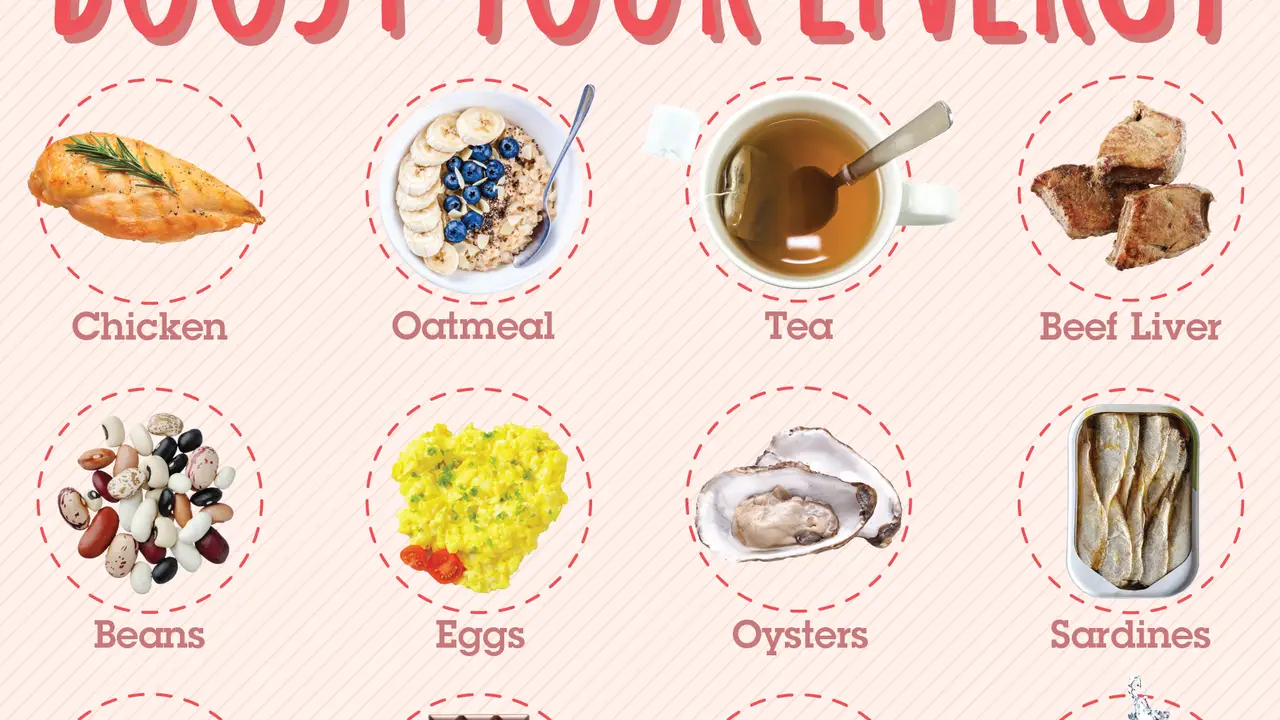7 Best Foods for Boosting Your Energy Levels

Feeling tired all the time? Discover the top 7 foods proven to increase energy and combat fatigue. Learn how these nutrients can improve your daily performance and overall well-being. Incorporate these energy-boosting foods into your diet for a healthier, more vibrant you.
Energy Boosting Foods: Why You're So Tired?
Okay, let's be honest, who *isn't* tired these days? Between work, family, social life, and everything else, it's no wonder our energy levels are constantly depleted. But before you reach for that third cup of coffee (which, let's face it, often leads to a crash later), let's talk about food. The right foods can be a game-changer when it comes to sustained energy. Think of your body like a car – you need the right fuel to keep it running smoothly. Poor food choices lead to sluggishness, energy dips, and that constant feeling of being drained. So, what are these magical energy-boosting foods we're talking about? Let's dive in!
Top 7 Energy Foods: Oats - A Complex Carbohydrate Powerhouse
First up, we have oats! This isn't just your grandma's breakfast anymore. Oats are packed with complex carbohydrates, which means they release energy slowly and steadily, preventing those dreaded sugar crashes. Plus, they're a great source of fiber, keeping you feeling full and satisfied for longer. Oats are also rich in B vitamins, which are essential for energy production. Think of B vitamins as the spark plugs for your metabolism – they help convert food into usable energy.
Product Recommendation: Bob's Red Mill Old Fashioned Rolled Oats. These are widely available, high-quality, and versatile. You can use them for oatmeal, overnight oats, smoothies, or even add them to baked goods. A 32-ounce bag typically costs around $4-5. If you are gluten-free, be sure to purchase certified gluten-free oats.
Usage Scenario: A perfect pre-workout breakfast or a mid-afternoon snack to combat that 3 pm slump.
Energy Foods: Eggs - Protein and Essential Nutrients Combined
Next on our list are eggs! These little powerhouses are packed with protein and essential nutrients, including choline, which is important for brain function. Protein helps stabilize blood sugar levels, preventing energy dips and keeping you feeling alert and focused. Eggs also contain leucine, an amino acid that plays a key role in muscle protein synthesis, making them a great choice for post-workout recovery.
Product Recommendation: Vital Farms Pasture-Raised Eggs. These eggs come from hens that are raised on pasture, resulting in richer flavor and higher nutrient content. A dozen typically costs around $7-9. Conventional eggs are a good option too, especially if budget is a concern.
Usage Scenario: Scrambled eggs for breakfast, hard-boiled eggs for a snack, or added to salads for a protein boost.
Boosting Energy Levels: Nuts and Seeds - Healthy Fats and Sustained Energy
Nuts and seeds are another fantastic source of sustained energy. They're packed with healthy fats, protein, and fiber, making them a satisfying and nutritious snack. Almonds, walnuts, chia seeds, and flaxseeds are all excellent choices. Healthy fats are essential for hormone production and brain function, while fiber helps regulate blood sugar levels.
Product Recommendation: Trader Joe's Raw Almonds and Chia Seeds. Trader Joe's offers high-quality nuts and seeds at competitive prices. A bag of almonds typically costs around $6-8, and chia seeds around $5-7. Alternatively, look for sales at your local grocery store.
Usage Scenario: A handful of almonds as a mid-morning snack, chia seeds sprinkled on yogurt or oatmeal, or walnuts added to salads.
Sustained Energy: Fatty Fish - Omega-3s and Brain Power
Fatty fish like salmon, tuna, and mackerel are rich in omega-3 fatty acids, which are essential for brain function and overall health. Omega-3s have been shown to improve mood, reduce inflammation, and boost cognitive performance. A healthy brain equals better focus and sustained energy.
Product Recommendation: Wild Alaskan Salmon (canned or fresh). Wild-caught salmon is generally considered to be higher in nutrients and lower in contaminants than farmed salmon. A can of salmon typically costs around $3-5, while fresh salmon can range from $15-25 per pound depending on the source and season.
Usage Scenario: Grilled salmon for dinner, canned salmon in a salad, or tuna sandwiches for lunch.
Foods for Energy: Leafy Greens - Vitamins and Minerals Galore
Leafy green vegetables like spinach, kale, and collard greens are packed with vitamins and minerals, including iron, which is essential for energy production. Iron deficiency can lead to fatigue and weakness. These greens are also rich in antioxidants, which protect your cells from damage and support overall health.
Product Recommendation: Organic Spinach (pre-washed and ready to eat). Pre-washed spinach is convenient and easy to add to smoothies, salads, or cooked dishes. A clamshell typically costs around $3-5.
Usage Scenario: Spinach added to smoothies, kale chips for a snack, or collard greens as a side dish.
Natural Energy Boost: Dark Chocolate - Antioxidants and a Little Treat
Yes, you read that right! Dark chocolate (with a high cocoa content, ideally 70% or higher) can actually boost your energy levels. It contains antioxidants and a small amount of caffeine, providing a mild energy boost without the jitters. Just be mindful of portion sizes, as it's still a treat!
Product Recommendation: Endangered Species Dark Chocolate (72% or higher). This brand offers delicious dark chocolate with a commitment to ethical sourcing and wildlife conservation. A bar typically costs around $3-4.
Usage Scenario: A square or two of dark chocolate as an afternoon pick-me-up.
Energy and Nutrition: Water - The Elixir of Life
Okay, water isn't technically a "food," but it's absolutely essential for energy production. Dehydration can lead to fatigue, headaches, and decreased cognitive function. Make sure you're drinking enough water throughout the day to stay properly hydrated.
Product Recommendation: A reusable water bottle. Choose a BPA-free water bottle that you can easily carry with you throughout the day. Brands like Hydro Flask and Nalgene are popular choices, ranging in price from $20-40.
Usage Scenario: Keep a water bottle with you at all times and sip on it throughout the day. Aim for at least 8 glasses of water per day, more if you're active.
Comparing Energy Foods: Price, Availability, and Convenience
When choosing energy-boosting foods, consider factors like price, availability, and convenience. Oats and eggs are generally affordable and widely available. Nuts and seeds can be a bit more expensive, but they offer a lot of nutritional value. Fatty fish can also be pricey, but canned options are a more budget-friendly alternative. Leafy greens are relatively inexpensive and easy to incorporate into your diet. Dark chocolate should be enjoyed in moderation as a treat.
Energy Boosting Foods and Their Uses
Each of these foods has unique properties that contribute to increased energy levels. Oats provide sustained energy, eggs offer protein and essential nutrients, nuts and seeds provide healthy fats, fatty fish boost brain function, leafy greens offer vitamins and minerals, dark chocolate provides antioxidants and a mild energy boost, and water keeps you hydrated. By incorporating these foods into your diet, you can improve your energy levels and overall well-being.
Energy Food Scenarios: When To Eat What?
Consider different scenarios when selecting your energy food. As a pre-workout meal, oats or eggs are a great choice. For a mid-afternoon snack, nuts, seeds, or dark chocolate can provide a quick energy boost. For dinner, fatty fish and leafy greens offer essential nutrients and support overall health. And remember to stay hydrated throughout the day with water.
Energy Food Product Comparisons: Brands and Types
When choosing products, consider factors like quality, price, and ethical sourcing. Look for organic options when possible and choose brands that are committed to sustainability. Compare prices at different stores to find the best deals.
More Energy Foods: Beyond The Basics
While these seven foods are a great starting point, many other foods can also contribute to increased energy levels. Consider adding foods like bananas (for potassium), sweet potatoes (for complex carbohydrates), and berries (for antioxidants) to your diet.
Lifestyle and Energy Foods: Combining Diet With Other Practices
Remember that diet is just one piece of the puzzle when it comes to energy levels. Other factors like sleep, exercise, and stress management also play a crucial role. Aim for 7-8 hours of sleep per night, engage in regular physical activity, and practice stress-reducing techniques like meditation or yoga.
:max_bytes(150000):strip_icc()/277019-baked-pork-chops-with-cream-of-mushroom-soup-DDMFS-beauty-4x3-BG-7505-5762b731cf30447d9cbbbbbf387beafa.jpg)






